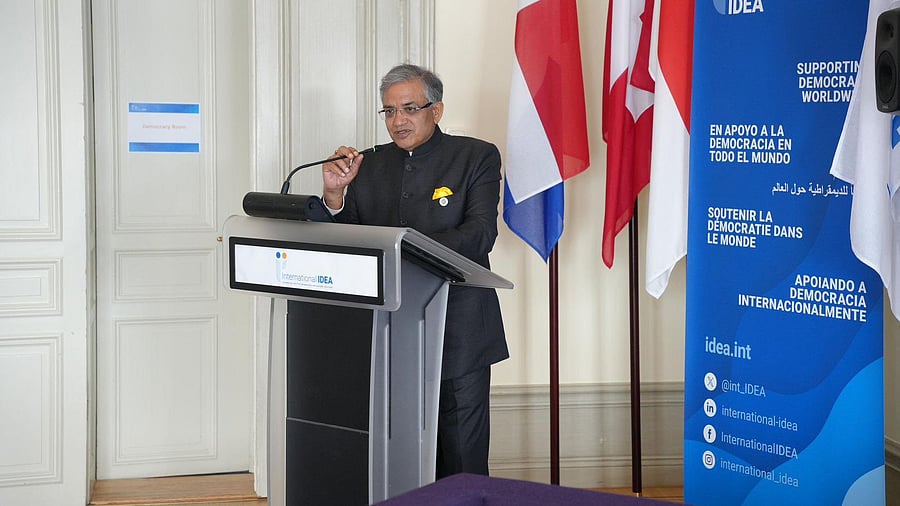
CEC Gyanesh Kumar delivers keynote address at the Stockholm International Conference on Electoral Integrity in Sweden on Tuesday.
Credit: Election Commission of India
New Delhi: Chief Election Commissioner Gyanesh Kumar has described the annual electoral roll revision process in the country as “one of the world’s most rigorous and transparent exercises” that plays a “vital role in upholding electoral credibility” year after year.
With around two crore personnel that includes poll staff, police, observers and agents of parties during elections, he said, the Election Commission becomes the world’s largest organisation, surpassing the combined workforce of several national governments and major global corporations and ensures that India’s nearly one billion voters are “freely able to exercise their franchise”.
His comments during his keynote address at the Stockholm International Conference on Electoral Integrity came against the backdrop of Congress leaders, including Rahul Gandhi, levelling complaints about the electoral rolls and the processes adopted during the Maharashtra Assembly elections held five months after the Lok Sabha polls.
Conducting elections with “utmost integrity” is a testament to our national resolve, he told the delegates of the conference organised by the International Institute for Democracy and Electoral Assistance (International IDEA) in Sweden. Around 100 participants representing Election Management Bodies (EMBs) of around 50 countries are taking part in the conference.
Underlining the massive scale of exercise undertaken by the EC, especially during the Lok Sabha elections, he said it is done under the close watch of the parties, candidates, general, police and expenditure observers and the media who act akin to concurrent auditors at various stages.
Referring to the “statutory sharing” of electoral roll with all recognised parties every year during revision as well as before the elections since 1960 till today, with provision of claims, objections and appeals, he said it is “one of the world’s most rigorous and transparent exercises, reinforcing the accuracy and integrity” of the electoral process.
This “robust mechanism” plays a “vital role” in “upholding electoral credibility” across the country, year after year, he said.
He said Indian elections over the decades have adapted to “increasing complexity while staying rooted in constitutional values”. From 17.3 crore in 1951–52 to 97.9 crore in 2024, and from just two lakh polling stations in the early years to over 10.5 lakh today, he said India’s electoral journey has demonstrated both institutional foresight and unmatched scale.
The 2024 Lok Sabha polls saw the participation of 743 parties, including six national parties and 67 state parties and 20,271 candidates as well as the use of 62 lakh Electronic Voting Machines (EVMs), he said.
On the inclusive design of Indian elections, he said the electoral process serves first-time voters, senior citizens aged over 85 years, persons with special abilities, third-gender electors, and voters in the most inaccessible regions “with equal care and commitment”.
From polling booths with a single elector to highest altitude stations like Tashigang in Himachal Pradesh, he said India’s commitment to leaving no voter behind was reiterated as a “constitutional principle rather than a logistical challenge”.
On the sidelines of the conference, Kumar held bilateral meetings with his counterparts from Mexico, Indonesia, Mongolia, South Africa, Switzerland, Moldova, Lithuania, Mauritius, Germany, Croatia, Ukraine and the United Kingdom focussing on issues like voter participation, electoral technology, diaspora voting, and institutional capacity-building.
